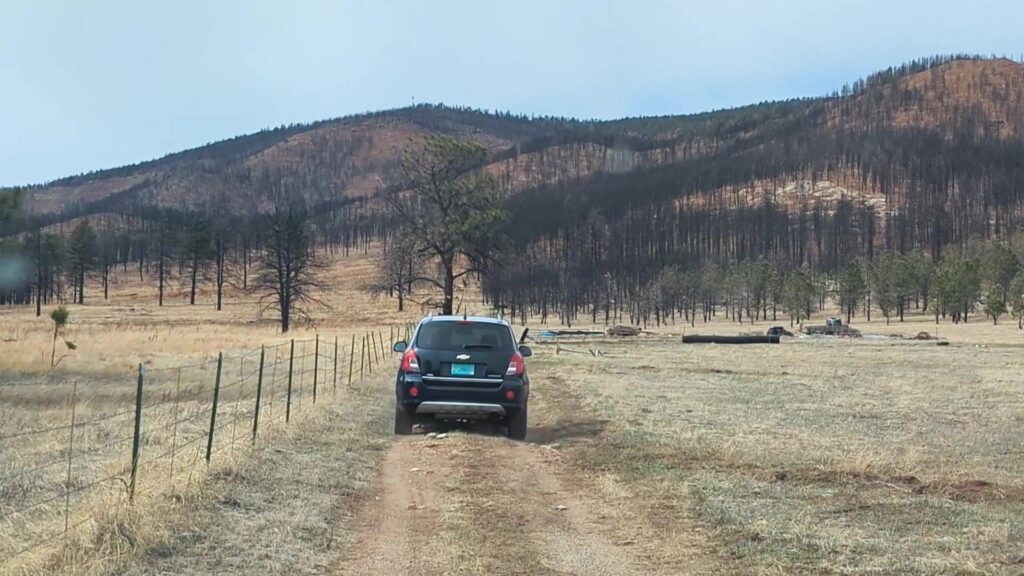Loving Our Changing Homelands

No matter where you live, climate change should be on your mind.
New Mexico is warming and it is drying. Our forests are changing, and our rivers and aquifers are dwindling, even as we demand more from them all the time.
Climate change touches every aspect of all our lives, whether you’re a farmer in the Lower Rio Grande or you own a mountain home and fear losing homeowners insurance. Fire season is longer and frankly, terrifying — especially when accompanied by post-fire flooding. Warming affects public health, whether fueling the pernicious spread of Valley Fever or making people who take certain medications more vulnerable to heat-related illnesses. And the more-than-human species we share this state with are suffering, too.
So, yes, if you’re paying attention to climate change, you’re probably feeling some existential dread. Our new show, “Loving Our Changing Homelands,” highlights some of those challenges. But I’m not asking you to lie in bed at night and worry. Nor do I want you to give in to despair or apathy.
In fact, when it comes to climate change, habitat loss, and environmental challenges, there remains good work to do on every scale, from your yard to the planet.
Policy changes and politics are important, for example, and it’s critical to elect officials who acknowledge — and understand — human-caused climate change, and then to hold them accountable every day they are in office. Greenhouse gas emissions must be reduced and where possible, eliminated, across industries. Certainly, new technologies can help us be more water- and energy-efficient. And there are easy ways for us each to make do with less. Less water, less electricity, less demand for consumer goods strewn about in our throw-away culture.
But most of all, living in a climate-changing world means that we need to remember, or decide upon, what we value, and what we love.
We can all love this place, New Mexico, that is our home, whether we’ve lived here since time immemorial, for eight generations, or just moved here recently. In loving our changing homelands, we can exhibit respect and reciprocity. And, we can come together in community, in all of our diverse ways, to adapt to a warming world.
Years ago, the writer Barry Lopez was in Albuquerque on a book tour. As a journalist, as a mother, and as a New Mexican, I always think of something he said. He said that it is okay to be in love with the world and to articulate that.
And so, at Our Land, with this special, we articulate our love of the world. A world that I know we can adapt to, equitably, sustainably, and joyfully.
I’m so thankful to all of the guests on “Loving Our Changing Homelands,” including hydrologist Phoebe Suina from the Pueblo of Cochiti; Paula Garcia, executive director of the New Mexico Acequia Association; Theresa Pasqual, director of the Tribal Historic Preservation Office at the Pueblo of Acoma; Sister Joan Brown, executive director of New Mexico & El Paso Interfaith Power and Light; and Aaron Lowden, Indigenous Seed Keepers Network Program Coordinator and a farmer at the Pueblo of Acoma. You can also watch the individual segments on the Our Land YouTube channel.
And as always, I’m thankful to the Our Land team, including Antony Lostetter who directed and edited the show and shot video along with John Britt and Joey Dunn.
And, oh, just to be absolutely clear: When we air a show about adaptation, I’m never for a moment suggesting that humans don’t need to work toward eliminating greenhouse gas emissions.
Now, for some resources, meetings, commentary, and news:
• Acequia Guide to Disaster Funding (from the New Mexico Acequia Association)
• Hermits Peak-Calf Canyon Landowner Hazard Tree Assistance Requests (New Mexico Forestry Division)
• The U.S. Department of Energy’s National Nuclear Security Administration and Office of Environmental Management are hosting a public town hall on Monday, June 22 at the Hilton Santa Fe Buffalo Thunder.
• You can still join some of the open houses — and take an online survey — regarding water planning in New Mexico. Head to the state’s website. And for real, enter your zip code and get started with the online survey. Especially if you can’t make it to one of the in-person events.
• “‘Everyone is drinking it’: Why this type of ‘forever chemical’ seems to be everywhere” (Amudalat Ajasa, The Washington Post)
• “Home Insurance Rates in America Are Wildly Distorted. Here’s Why.” (Christopher Flavelle and Mira Rojanasakul, The New York Times)
• “New Satellites Alone Won’t Stop the Methane Climate Crisis” (Justin Mikulka and Sharon Wilson, Scientific American)
• “Hurricane Beryl was a warning shot for Houston” (Dylan Baddour, Texas Observer)
• “As temperatures rise in New Mexico, a new extreme heat summit highlights public health challenges” (Bryce Dix, KUNM)
• “Albuquerque made itself drought-proof. Then its dam started leaking.” (Jake Bittle, Grist)
P.S. If a friend forwarded you this message, sign up here to receive the newsletter yourself. You can also read recent newsletters online. And if you miss us throughout the week, follow Our Land on Instagram.


